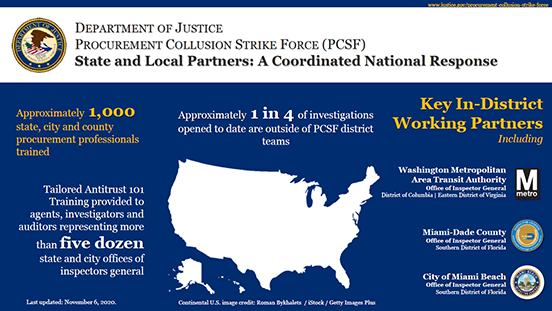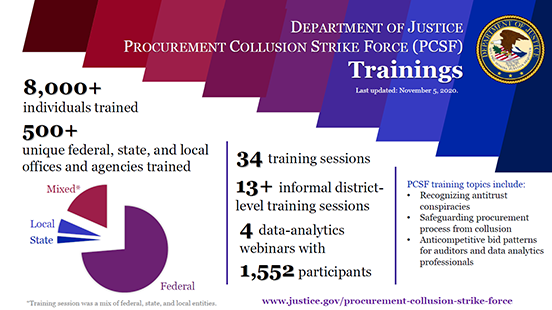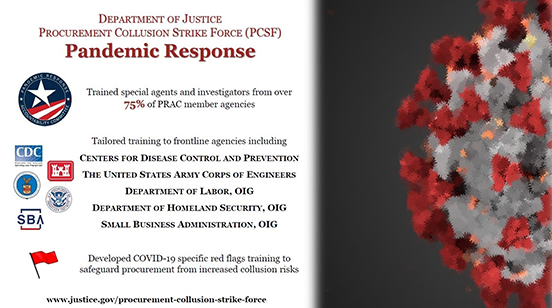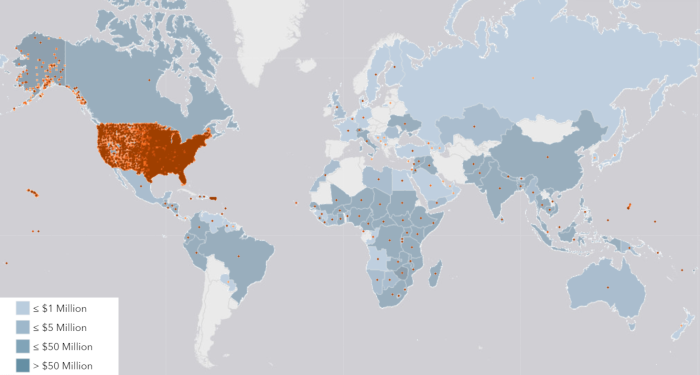Related Content
Press Release
This is archived content from the U.S. Department of Justice website. The information here may be outdated and links may no longer function. Please contact webmaster@usdoj.gov if you have any questions about the archive site.
This month, the Justice Department celebrates the first anniversary of the Procurement Collusion Strike Force (PCSF), a coordinated national response launched in November 2019 to combat antitrust and related schemes in government procurement, grant, and program funding at all levels of government. The PCSF’s successful first year featured enthusiastic support from the Council of the Inspectors General on Integrity and Efficiency (CIGIE), exponential growth and expansion with in-district working partners added across the country, and several thousand government employees trained on antitrust crimes and related schemes. The Department will continue to expand the PCSF in its second year by adding nine new U.S. Attorney’s Offices, the Department of Homeland Security, Office of Inspector General (DHS OIG) and the U.S. Air Force Office of Special Investigations (AFOSI) to the interagency partnership.
The PCSF’s First Year of Action
“I commend the hardworking prosecutors and agents for their impressive work during the PCSF’s first year of action, despite the unprecedented challenges posed by the pandemic. The premise and promise of the PCSF was to increase collaboration among federal prosecutors and law enforcement agencies to protect the public purse and hold accountable those who corrupt the competitive process to rob taxpayers of the benefits of free competition,” said Assistant Attorney General Makan Delrahim, of the Department of Justice’s Antitrust Division, which is leading the PCSF effort. “We’ve proven the concept and with opening more than two dozen active grand jury investigations in the past year, we have made good on our promise to go after cartels that cheat the government.”
Through initial outreach efforts to federal, state, and local government agencies, paired with tailored training programs aimed at those who touch procurement dollars from pre-bid to award and oversight, the PCSF has laid the groundwork for cooperation that effectively deters and detects antitrust crimes victimizing taxpayer-funded agencies, programs, and projects. In addition to facilitating reporting of anticompetitive conduct, the PCSF has been a tireless advocate of proactive new ways to detect bid rigging and other crimes, particularly in the area of collusion analytics where it functions as a knowledge-sharing forum for data teams across the government to collaborate and share best practices.
New National Partners
Building on the early successes of the PCSF, Assistant Attorney General Delrahim announced today that the PCSF is adding 11 new national partners to the Strike Force, for a total of 29 agencies and offices committed on the national level to combatting procurement collusion in government spending. Of the new partners, nine are U.S. Attorneys’ Offices, with complementary enforcement priorities in U.S. cities with diverse government spending profiles. The PCSF is also welcoming as national partners the United States Air Force Office of Special Investigations) and Department of Homeland Security, Office of Inspector General, two critically important law enforcement partners with proven track records of working with the PCSF as well as the Antitrust Division.
“I am excited to welcome these new partners to the PCSF effort,” Delrahim said. “By growing our national footprint, and folding in additional subject-matter experts, the PCSF is poised for even more success in its next year.”
The PCSF’s 22 U.S. Attorney partners include:
The PCSF’s national investigative partners include:
*Asterisk indicates a newly added partner as of November 2020.
The PCSF today looks different from the initial district teams of 6-8 members each; the Strike Force currently has more than 360 agent, analyst, and other law enforcement and OIG working members, hailing from 46 unique agencies and offices at the federal, state, and local levels.

Trainings and Collaborations
The PCSF has trained more than 8,000 individuals, educating new audiences on identifying and reporting the “red flags” of collusion. While the pandemic posed several new challenges for outreach and training, the PCSF as a virtual strike force was uniquely well-positioned to pivot to interactive online training programs that have reached broad audiences across the country. In addition to nationwide webinars, individual PCSF district teams provided practical trainings to more than 30 different teams, offices, and agencies, ranging from presentations on protecting the procurement process during COVID-19 to discussions on spotting and responding to antitrust violations in hotline complaints. The Strike Force has also collaborated with CIGIE’s Inspector General Criminal Investigatory Academy to provide training to approximately 1,500 special agents, investigators, and certified fraud examiners. These training efforts have boosted levels of antitrust awareness across the target communities and prompted tips to the PCSF for further investigation.

Data Analytics
Over the last year, the PCSF has boosted the strategic use of data analytics to proactively identify suspicious bid patterns that warrant further investigation and retroactively leverage data to propel existing investigations forward. The PCSF has also served as a hub for sharing best practices on collusion analytics and hosted four data analytics events for the OIG community, each averaging attendance of approximately 300 participants.
Pandemic Response
In the eight months since the Presidential declaration of a national emergency due to the COVID-19 virus, the PCSF successfully used technology to deliver interactive training experiences to groups of varying sizes. The PCSF also developed pandemic-focused training to address the heightened collusion risks in light of exigent procurement by government agencies. Following the blueprint of the district-based model, district teams facilitated conversations with agency partners on COVID-19 related fraud and collusion patterns and participated in local COVID-19 fraud task forces. The PCSF served a deconfliction role in referring substantive COVID-19 related tips to the DOJ COVID-19 Hoarding and Price-Gouging Task Force and the Department of Justice’s National Center for Disaster Fraud.
The PCSF strengthened relationships through focused outreach to agencies with oversight responsibility of CARES Act funding including the Department of Labor, Office of Inspector General, Department of Health and Human Services, Office of Inspector General, the Pandemic Response Accountability Committee (PRAC), and the Small Business Administration, Office of Inspector General.

The PCSF also developed training for the contract management workforce at the Federal Emergency Management Agency (FEMA), and the Centers for Disease Control and Prevention (CDC) to safeguard these critical supply chains and procurement processes from collusion and fraud.
International Reach
The PCSF has several partners with oversight responsibility for U.S. government spending abroad that represent a diverse mix of federal agencies. These partners play a critical role in deterring, detecting, investigating, and prosecuting those who undermine competition for U.S. government contracts and grants abroad. As evident in past investigations, such as the South Korea Fuel Supply investigation contracts in South Korea, and from current pandemic spending patterns, U.S. government procurement is not limited by borders, and neither can the PCSF’s efforts to deter, detect, and prosecute misconduct.


Assistant Attorney General Delrahim also showcased the Strike Force in recent presentations delivered to the Organization for Economic Cooperation and Development (OECD) and the International Competition Network (ICN). Delrahim highlighted the structure and early successes of the PCSF with the hope that “the Strike Force can serve as a model for other countries looking for innovative ways to more effectively fight bid rigging and other anticompetitive schemes that impact public procurement, and cheat taxpayers, all over the world.” A recording of the ICN presentation is available at https://www.justice.gov/atr/video/icn-2020-conference-procurement-collusion-strike-force-showcase
Assistant Attorney General Makan Delrahim; Nick Hanna, U.S. Attorney for the Central District of California; Kevin James, Former President of the Los Angeles Board of Public Works; and David J. Scott, Supervisory Special Agent at the FBI underline the accomplishments of the PCSF on September 16, 2020.

In the coming year, the PCSF expects to continue its focus on protecting U.S. funds spent beyond our borders and coordinating with international counterparts.
New Leadership
Assistant Attorney General Delrahim announced that Daniel Glad will serve as Director of the PCSF. Glad, who previously served as an Assistant Chief in the Antitrust Division’s Chicago Office since April 2019, is the Strike Force’s first permanent director.
“Naming a permanent PCSF director is an important step to continue its growth and success,” said Delrahim. “I’m confident that Dan, who has experience working with agents from various agencies to fight bid rigging, price fixing, and other crimes in Chicago, will bring his dedication and innovation to this nationwide effort.” Prior to his work at the Antitrust Division, Glad was an Assistant Inspector General for the City of Chicago, Office of Inspector General. He was also an associate in the antitrust and white-collar practice groups of an international law firm in Chicago and Washington, D.C, and previously served as Special Assistant United States Attorney at the U.S. Attorney’s Office for the Northern District of Illinois.
The PCSF also gained its first Assistant Director in Sandra Talbott. Talbott, who currently is a Trial Attorney in the Division’s Chicago Office, has experience as a prosecutor at the local, state, and federal levels. Prior to her time in the Department of Justice, Talbott also was a Vice-President and Director of Compliance at a multi-billion-dollar financial institution.
Looking Forward
As the PCSF enters its second year, it will continue to investigate aggressively cases of price fixing, bid rigging, and market allocation that target American taxpayer dollars, especially as COVID-19 collusion schemes become more evident in the peak of rapid acquisition. The Strike Force partners stand ready to pursue new leads and open additional investigations using the full range of criminal and civil tools available to the federal government, including the Clayton Act’s Section 4A authority to pursue treble damages, to hold accountable corporations and individuals that undermine competition in government spending.
The PCSF has a publicly available website at www.Justice.gov/Procurement-Collusion-Strike-Force, where members of the public can review information about the federal antitrust laws and training programs, and report suspected criminal activity affecting public procurement. Individuals and companies are encouraged to contact the PCSF if they have information concerning anticompetitive conduct involving federal taxpayer dollars by emailing pcsf@usdoj.gov or filling out the PCSF anonymous complaint form, located on the PCSF website.
Federal, state, and local agencies can also contact the PCSF at pcsf@usdoj.gov for any training needs or to report suspected antitrust violations.